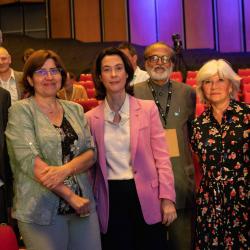France aims to become the first major country to phase out fossil fuels. Firstly, with policies promoting energy sufficiency and efficiency; and regarding sufficiency we are now heading in Europe with what is seen as the most advanced policy. Secondly by increasing decarbonized energy production through renewable sources and nuclear power.
Main takeaways of the REFLEXIONS Conference 2023

The REFLEXIONS Conference 2023, gathered international speakers from the public and private sectors, as well as civil society representatives. The goal was to tackle the urgent challenges brought about by climate change and suggest pioneering resolutions. The conference was inaugurated by Agnès Pannier-Runacher, the French Minister of Energy Transition, and Eric Labaye, President and Chairman of Institut Polytechnique de Paris and École Polytechnique.

In an effort to foster a truly international dialogue, three prominent global figures enriched the conference with their invaluable insights:
- Kahea Pacheco, Co-Executive Director of Women's Earth Alliance, United States - Watch the replay
- Tjaša Ficko, Deputy Mayor of the City of Lubjiana, Sloveni - Watch the replay
- Rajendra Shende, Founder of Green TERRE Foundation and Former Director of UNEP - Watch the replay
The REFLEXIONS conference's program featured three distinct sessions, each focused on a specific aspect of climate change regulation
The first session focused on Science-Based Regulation for the Energy Sector. This session, with a keynote speaker, Teresa Ribera, Spanish Minister for Ecological Transition, also featured prominent speakers such as Estelle Brachlianoff (Chief Executive Officer of Veolia), Laurence Tubiana (Chief Executive Officer of the European Climate Foundation), Valérie Masson-Delmotte (CEA Senior Scientist at LSCE of the Institute Pierre Simon Laplace), and Philippe Drobinski (Director of Energy4Climate Center).

Academic institutions also play a crucial role in providing technical solutions and social sciences expertise to facilitate this transition. Collaboration and innovation are key to achieving the desired outcomes.
The second session was about Green Finance Regualtion and gathered Jo Tyndall, Director of Environment at OECD, the keynote speaker for this session, and experts like Patricia Crifo (Professor at École Polytechnique, IP Paris & Deputy Director of the Energy4Climate Center), Pierre-Alix Binet (Head of Institutional and Regulatory Affairs at La Banque Postale), Paul Schreiber (Senior Policy Advisorat Reclaim Finance), Peter TANKOV (Professor of quantitative finance at ENSAE Paris, IP Paris), and Virginie Vitiello (Head of Socially Responsible Investing, Caisse des Dépôts Group).

Improved and consistent metrics and methods for measuring alignment are essential. Environmental credibility is a key focus for the OECD in transition finance, especially in hard-to-abate sectors.
And lastly the third and final session focused on Markets Regulation and Consumer Behavior. It featured insights from industry leaders such as Nathalie Stubler (Special advisor on decarbonization for Air France KLM group), Thibaud Vergé (Vice President of the French Competition Authority), Isabelle Spiegel (Global Head of Environment, VINCI), Serge Abiteboul (Board member of the French Electronic Communications Regulatory Authority), and Pierre-Jean Benghozi (Professor of Digital Economics at École Polytechnique, IP Paris), providing a comprehensive exploration of the markets' role and consumer behavior in the fight against climate change.

The question is how do we help firms build trust with their consumers? There needs to be a trade-off between letting firms make the claims they want for their products, allowing them to compete on that dimension, to innovate and bring new products to markets, but at the same time creating common ways to advertise and label products, to build trust for consumers. But this can only work with market regulation and consumer protection agencies.
Furthermore, a dedicated group of 11 students from École Polytechnique, ENSAE Paris, ENSTA Paris, and École des Ponts, representing a diverse range of engineering, master, and PhD programs, actively participated in the conference. These students not only formulated pertinent questions on behalf of the youth but also engaged with the panels and the public, ensuring that the conference's discussions remained relevant, inclusive, and forward-thinking (Alicia Bassière, Johanne Trotin, Ekaterina Ghosh, Lena Monasse, Ulysse Collé, Mathias Gilbert, Margaux Millaret, Baptiste Vié, Anselme Godard, Isabelle Steiger, Marcus Le Henaff, and Emilien Gouffault). Their contributions added a vital perspective to the conference's discourse, emphasizing the importance of intergenerational collaboration in the pursuit of effective climate regulation.
The REFLEXIONS Conference 2023 is a crucial platform for sharing knowledge and shaping collective action. With COP 26 and 27's momentum, COP 28 emerges as a transformative moment. COP 28 presents an opportunity for fossil fuel-reliant nations to lead in diversifying toward a greener future. Finance-related negotiations at COP 28 are significant, focusing on climate finance goals, loss and damage funding, and financial structure reforms, supporting vulnerable nations and mitigating climate change effects.
COP 28's agenda showcases resolute commitment to action, from a global stock take to ambitious renewable energy and emissions reduction goals. Regulation, evolving frameworks, and innovative partnerships are key to success.
As we look forward to COP 28, we stand on the precipice of meaningful change, guided by science, consensus, and a shared responsibility for a sustainable and resilient future.


















